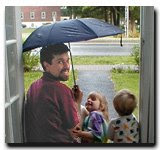What's Happening in the Local Environmental Scene and Beyond
On Tuesday, November 18, the Maine Legislature’s Transportation Committee voted to accept a negotiated conservation easement for Sears Island but to leave it unsigned, meaning no action will be taken. Instead, the committee requested a bill in the next Legislature instructing the Maine Department of Transportation to pursue the permitting of a cargo port on Sears Island, which is owned by the State of Maine. At the head of Penobscot Bay, Sears Island is the largest causeway accessible undeveloped island on the eastern coast of the United States. At issue is whether the development of a cargo port will be permitted on the island.
The Ocean Energy Institute, a tiny research organization founded by Maine resident Matthew Simmons, hopes to build a 5-gigawatt, deep-water
wind farm--the largest in the world--in the Gulf of Maine. Because the winds are strongest several miles offshore, the turbines would be built on floating platforms anchored some 12 to 20 miles off the coast in waters 100 to 200 meters deep. The target generating capacity of 5 gigawatts equals the power required to replace the use of home heating oil in Maine. The Gulf of Maine has an estimated wind power potential of 100 gigawatts, peaking in winter when winds are stronger.
Arctic sea ice and climate are behaving in ways not seen before in the satellite record—both in the rate and extent of ice loss during the spring and summer, and in the record ice growth rates and increased Arctic air heating during the fall and winter. During the 2008 melt season, Arctic sea ice declined by a record 10.58 million square kilometers, then rebounded at an astounding rate. As of October 31, ice extent was at 9.27 million square kilometers, more than doubling since the annual minimum of 4.52 million square kilometers measured on September 14, 2008. Over much of the Arctic, especially over the Arctic Ocean, air temperatures were unusually high, consistent with rapid ice growth. Near-surface air temperatures in the Beaufort Sea north of Alaska were more than 7 degrees Celsius above normal and the warming extended well into higher levels of the atmosphere.
Thursday, December 4 - The Kennebec Estuary: Health and Sustainability, 7 pm, Long Reach Hall, Maine Maritime Museum, Bath, Maine. A presentation of The State of the Kennebec Estuary, a research project contracted by the Kennebec Estuary Collaboration. This report assesses current ecological conditions of the estuary and identifies key challenges and opportunities for conservation of this unique system. Speakers: Slade Moore, Director of Biological Conservation, Jaret Reblin, Biologist. For more information, call 442-8400.
Thursday, December 4 - Wildlife Rehabilitation: Raptors, Reptiles & More, 7 pm, Curtis Memorial Library, Brunswick. A presentation by Karen McElmurry, Director, Center for Wildlife. Part of the Friends of Merrymeeting Bay Speaker Series. For more information, contact Misty Gorski at 582-5608.
Thursday, December 11 - Sustainable Gifts, 7 pm, F.W. Horch, 56 Maine Street, Brunswick. Tie into the deeper meanings of the holiday time by giving simple, sustainable gifts. Join us for some ideas about gifts that nurture relationships, build on old and new rituals, and create environmentally sustainable and just communities. Space is limited! To reserve a spot, please call us at 729-4050.
Please note: our store will be closed from Thursday, December 25 through Thursday, January 1, 2009, re-opening on Friday, January 2. Happy Holidays!

 ActiveTrax on the Go Audio
ActiveTrax on the Go Audio
 SolarSheat Space Heater The SolarSheat hot air collector is a self-contained and self-powered sustainable solution for space heating. Mounts on a south-facing wall or roof. No need for plumbing or electricity -- these units have a built-in solar-powered fan to blow in warm air whenever there is sun. Now anyone can go solar!
SolarSheat Space Heater The SolarSheat hot air collector is a self-contained and self-powered sustainable solution for space heating. Mounts on a south-facing wall or roof. No need for plumbing or electricity -- these units have a built-in solar-powered fan to blow in warm air whenever there is sun. Now anyone can go solar!






